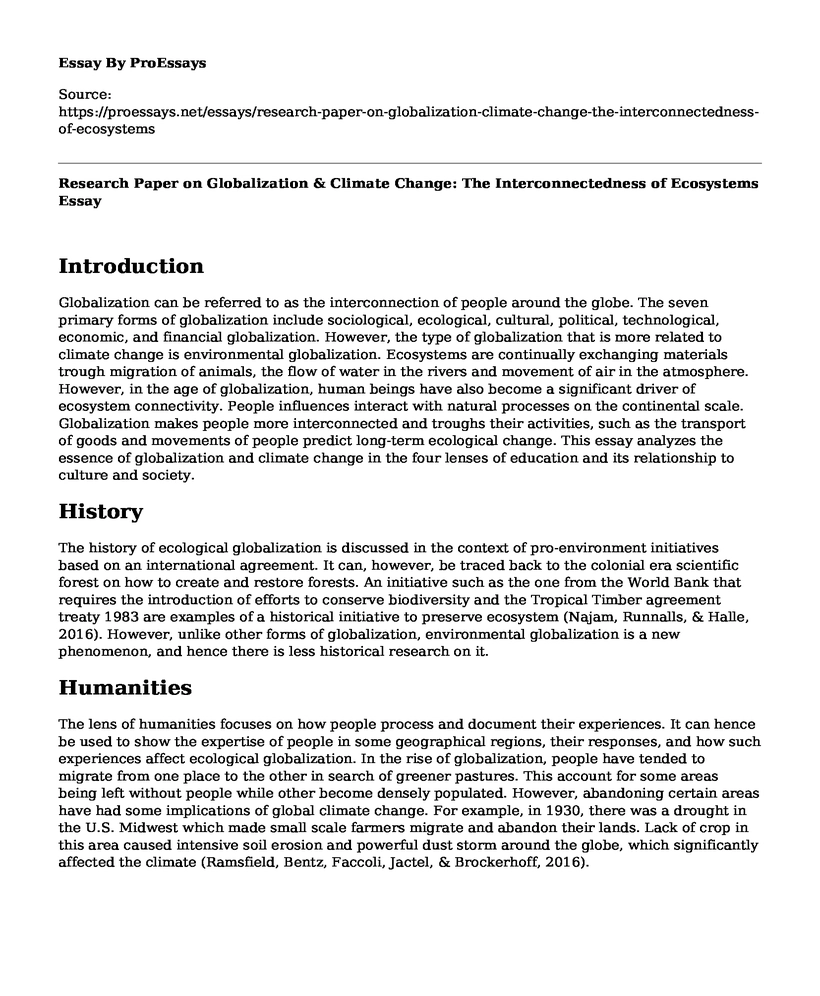Introduction
Globalization can be referred to as the interconnection of people around the globe. The seven primary forms of globalization include sociological, ecological, cultural, political, technological, economic, and financial globalization. However, the type of globalization that is more related to climate change is environmental globalization. Ecosystems are continually exchanging materials trough migration of animals, the flow of water in the rivers and movement of air in the atmosphere. However, in the age of globalization, human beings have also become a significant driver of ecosystem connectivity. People influences interact with natural processes on the continental scale. Globalization makes people more interconnected and troughs their activities, such as the transport of goods and movements of people predict long-term ecological change. This essay analyzes the essence of globalization and climate change in the four lenses of education and its relationship to culture and society.
History
The history of ecological globalization is discussed in the context of pro-environment initiatives based on an international agreement. It can, however, be traced back to the colonial era scientific forest on how to create and restore forests. An initiative such as the one from the World Bank that requires the introduction of efforts to conserve biodiversity and the Tropical Timber agreement treaty 1983 are examples of a historical initiative to preserve ecosystem (Najam, Runnalls, & Halle, 2016). However, unlike other forms of globalization, environmental globalization is a new phenomenon, and hence there is less historical research on it.
Humanities
The lens of humanities focuses on how people process and document their experiences. It can hence be used to show the expertise of people in some geographical regions, their responses, and how such experiences affect ecological globalization. In the rise of globalization, people have tended to migrate from one place to the other in search of greener pastures. This account for some areas being left without people while other become densely populated. However, abandoning certain areas have had some implications of global climate change. For example, in 1930, there was a drought in the U.S. Midwest which made small scale farmers migrate and abandon their lands. Lack of crop in this area caused intensive soil erosion and powerful dust storm around the globe, which significantly affected the climate (Ramsfield, Bentz, Faccoli, Jactel, & Brockerhoff, 2016).
Natural and Applied Sciences
Natural and applied science can be used to show why globalization has had an impact on climate change. Economic globalization resulted in the aspect of industrialization and urbanization. As countries produce more and more goods to trade in the international markets, the emission of CO2 and other detrimental gases are released to the atmosphere. This cause global warming which, according to natural science, is the primary threat to climate change (Crist, 2007). Toxic gases released by aircraft as they transport goods from one country to the other cause intensive pollution in the environment.
Social Sciences
In the lens of social science, globalization has impacted on climate change due to the nature of humankind. Human life in the age of globalization has been doing anything possible as far as they benefit without putting into consideration the well-being of the environment. A good example has been deforestation for global trade. For example, mountains are being cut to pave the way for highways and tunnel for global business. The other typical behavior is the manufacture and use of plastic which is the non-biodegradable product which is a major toxic pollutant. Despite their detrimental effects on the environment, most countries still use them for preserving and packing export goods (Moser & Hart, 2015).
Conclusion
Globalization can have an impact on the aspect of climate change. This relates to the issue of ecological globalization. However, this is a new phenomenon of globalization effect that needs more research to find a possible solution. Human nature seems only oriented on economic gain forgetting the environment wellbeing. This threatens the future of the world, and hence a quick response is required.
References
Crist, E. (2007). Beyond the climate crisis: A critique of climate change discourse. Telos, 141(Winter), 29-55.
Moser, S. C., & Hart, J. A. F. (2015). The long arm of climate change: societal teleconnections and the future of climate change impacts studies. Climatic Change, 129(1-2), 13-26.
Najam, A., Runnalls, D., & Halle, M. (2016). Environment and Globalization: Five Propositions (2010). The Globalization and Environment Reader, 94.
Ramsfield, T. D., Bentz, B. J., Faccoli, M., Jactel, H., & Brockerhoff, E. G. (2016). Forest health in a changing world: effects of globalization and climate change on forest insect and pathogen impacts. Forestry, 89(3), 245-252.
Cite this page
Research Paper on Globalization & Climate Change: The Interconnectedness of Ecosystems. (2023, Feb 12). Retrieved from https://proessays.net/essays/research-paper-on-globalization-climate-change-the-interconnectedness-of-ecosystems
If you are the original author of this essay and no longer wish to have it published on the ProEssays website, please click below to request its removal:
- Film Analysis Essay on Polluting Paradise: Environmental Issues Portrayed in the Film
- Research Paper on Climate-Change Policies for Low Carbon Transition
- Employment Security: Analysis of Outside Sources & Public Policies - Essay Sample
- Recycling: A Need for Accurate Processes to Protect Environment - Essay Sample
- Paper Example on American Factory: Hope and Frustration in Uneasy Union
- Free Essay Example on 14 Principles of Management
- Report on Decoding Antibiotic-Free Labels: Standards, Definitions, and Public Health Concerns in Animal Farming







